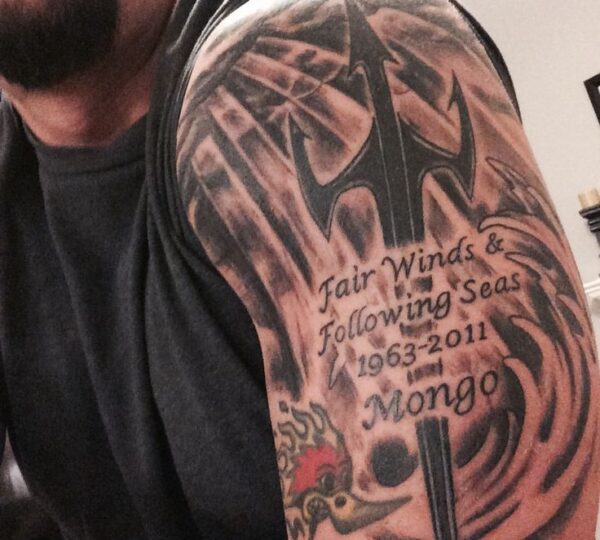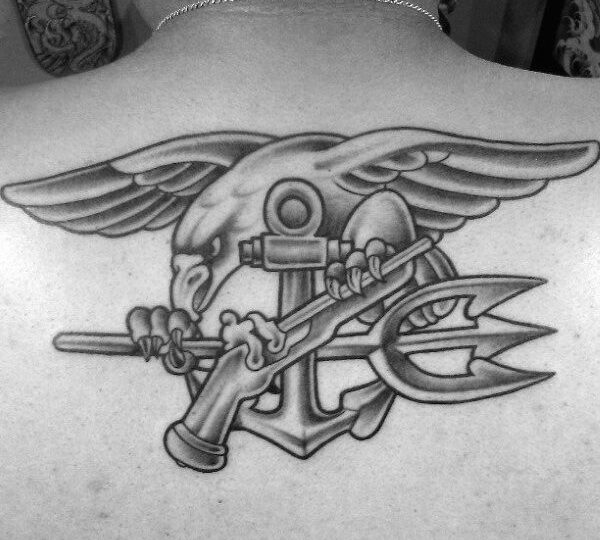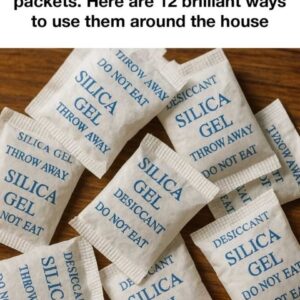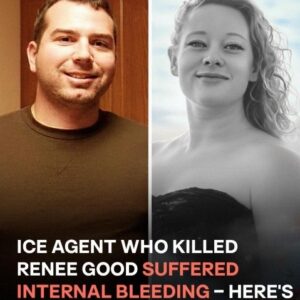For most of my life, my father introduced me in a way that made me feel like I was standing at the edge of my own story rather than the center of it.“This is my little clerk,” he’d say with an easy chuckle, as if it were a harmless nickname.
As if the years I’d spent in silence, discipline, and service could be condensed into a single, small, convenient label. As if I had never become more than the girl he remembered sorting mail during her high school internship at the base where he once served.
And for years, I let him say it.I told myself it was easier.Easier for him, easier for me, easier than explaining the truth — a truth he never asked for and I never offered.But the universe has a way of revealing what we try to hide. Sometimes gently. Sometimes abruptly.For me, the moment came on a quiet, sun-washed afternoon, at a backyard barbecue filled with folding chairs, faded lawn ornaments, and men who once lived by routine, discipline, and duty.
The Return Home
I hadn’t been home for almost a year. Duty, deployments, briefings, and classified responsibilities had built a rhythm around my life that didn’t include backyard parties or small-town gatherings.
When the time finally came for me to visit, I arrived straight from a change-of-command ceremony in Washington, D.C. There was no time to change, no time to prepare myself emotionally, and honestly, no energy left to care.
I walked into my father’s yard still wearing my dress whites. The medals and ribbons on my chest caught the sunlight and scattered it across the crowd like small shards of truth—truth I hadn’t shared, truth he had never noticed, truth I no longer felt compelled to hide.
But he didn’t see any of that.
He saw his daughter.
He saw the girl who used to run across this lawn barefoot and sunburned, the girl who had once sat on the back steps watching him polish his old Navy boots, dreaming of a world she didn’t yet understand.
He grinned wide, stepping forward as if nothing complicated had ever existed between us. A grin he used like armor—bright, distracting, easy.
“Our little clerk is home!” he declared proudly.
A bubble of polite laughter rose from the crowd. The kind of laughter offered to keep the peace, not because anyone truly understood what was being said.
I swallowed the familiar sting of the nickname. It wasn’t new. It wasn’t surprising. It wasn’t even meant to be cruel.
It was just… small.

The Men Who Watched Without Seeing
My father began introducing me to the men scattered around the yard—retired Navy, retired Marines, retired Army. Men who carried the heaviness of their past the way others might carry scar tissue: quietly, privately, permanently.
“This is my daughter, Alex,” my father said. “Navy intel. She does coordination, paperwork, that kind of thing.”
The men nodded politely. One man in a faded Recon t-shirt lifted his beer like a muted salute. Another, a logistics officer who had retired younger than he expected due to an injury, gave me a sympathetic nod as if he understood the monotony of paperwork better than anyone.
I didn’t correct any of them.
I didn’t expand on my work.
I didn’t explain that “intel” was a polite, small umbrella for a career that had taken me through shadows most people never knew existed.
I simply stood there, listening, smiling when necessary, waiting for the inevitable moment when someone would ask a question I couldn’t answer without violating two dozen nondisclosure agreements.
But then a man stepped forward who wasn’t interested in small talk.
The SEAL Who Saw Too Much
He looked different from the others—mid-thirties, sharper posture, alert without announcing it. Some men never fully step out of the rhythm of service, and he was one of them.
It was in the way he scanned the yard, the way his feet stayed evenly planted, the way his eyes flicked to shadows just long enough to register them.
“Commander Jacob Reins,” he said. “SEAL Team.”
I returned the greeting, noting his bearing, his tone, his habit of watching without seeming to. We exchanged a few harmless words, the kind veterans and active-duty officers use to gauge each other’s past without interrogating it.
Then he saw it.
The tattoo.
Just a sliver of it, peeking from under my sleeve—a stylized trident with a simple number: 77.
He went still.
His eyes narrowed—not in suspicion, but in recognition. In recalculation.
His expression shifted from polite interest to something much heavier, much sharper.
He looked from the tattoo to my ribbons, from my ribbons to the insignia on my shoulder, and then directly into my eyes.
“Unit Seventy-Seven,” he said quietly. Not a guess. Not a question. A confirmation.
“Correct,” I replied.
A hush fell over the yard like a curtain dropping.
Someone stopped walking.
Someone else set down a cup too hard.
The world grew very, very small.
The Moment the Truth Broke Open
My father frowned, confused. “What’s Unit Seventy-Seven?”
Reins didn’t answer. Instead, he took half a breath, straightened instinctively, and let his training guide him.
His voice changed—lower, more formal, more grounded.
“Admiral Callahan. Ma’am. It’s an honor.”
Every conversation in the yard died instantly. Men who had been laughing moments earlier fell silent. The Recon officer lowered his beer. The logistics man blinked. Even the grill hissed more softly.
My father stared at me as if he had been handed a stranger.
“You’re an admiral?” he whispered.
Reins answered for me. “Rear admiral. Two stars.”
My father looked at my uniform like he was seeing it for the first time—the stripes, the insignia, the medals he had glanced over for years without understanding them.
“You said you did coordination,” he said quietly.
“I do,” I told him softly. “And command.”
The Barbecue Collapses
The party dissolved faster than I expected. The men drifted away, each quietly recalibrating everything they thought they knew. Reins stayed near the driveway, guilt written across his expression.
“I’m sorry,” he said. “I didn’t mean to reveal anything.”
“You didn’t reveal anything,” I told him. “You just recognized it.”
Inside the house, my father sat at the kitchen table, suddenly small in the home he once dominated with confidence and noise.
“I didn’t know,” he said.
“You never asked,” I replied.
The words landed harder than I intended. He looked down, shoulders wilting under the weight of years.

The Truth Behind the Silence
The truth is complicated.
I didn’t hide my accomplishments out of spite.
I didn’t pursue them to prove anything to him.
I became who I am because I wanted to serve. Because I wanted to protect. Because I wanted to build a life defined by integrity, not recognition.
My path was built quietly:
-
Intelligence work that shaped missions no one would ever publicly discuss
-
Deployments where survival meant making decisions in seconds
-
Operations that required absolute precision
-
Losses that never made headlines
-
Victories that no one celebrated
Bahrain taught me endurance.
Kandahar taught me limits.
Special operations taught me responsibility that stretched far beyond rank.
By my late thirties, I was a commander.
At forty, a member of Unit Seventy-Seven.
At forty-one, its commanding officer.
The stars came later.
My father never knew any of that.
He never asked.
And I never volunteered.
Correcting him felt like shifting the earth beneath both of us.
The Night Everything Shifted
Months later, at a formal gala, he joked to a group of donors about me “finally being able to pay rent.”
Five minutes later, I walked onstage as Major General Callahan to deliver the keynote address.
The moment he realized the truth, the glass slipped from his hand. The shatter echoed like the breaking of years of misconceptions.
“Why didn’t you tell me?” he asked afterward.
“You didn’t ask,” I repeated.
This time, the words didn’t land as an accusation. They landed as truth — heavy, necessary, overdue.
The Long Process of Understanding
Something changed in him after that.
He began volunteering with veterans.
He listened to stories he once avoided.
He learned to speak quietly about pride instead of loudly about assumptions.
When his friends asked what I did, he didn’t joke or minimize anymore.
“She’s an admiral,” he would say.
He offered me his old Navy ring one day. I declined.
He mailed it to me later anyway, with a note:
“I’m learning what it means to be proud without overshadowing someone.”
His Final Days
In hospice, he kept a notebook with questions he wished he’d asked earlier.
Questions about my deployments.
About my command.
About the moments I never talked about.
About who I became when he wasn’t looking.
He didn’t get to ask them all.
I didn’t get to answer them all.
But he died trying to understand, and that mattered.
At his funeral, when the flag was folded and placed in my hands, I felt the weight of two lives — his and mine — finally meeting in one moment of truth.
Where the Journey Leads
Years passed. My responsibilities grew.
I briefed leaders who outranked me.
I delivered decisions that carried consequences far beyond rooms and walls.
I advised men who had underestimated me years earlier.
Eventually, the third star came.
Even now, people sometimes mistake me for an aide.
I don’t correct them.
Because identity isn’t granted by strangers.
It’s built in silence, in perseverance, in moments no one sees.

The Real Lesson
One afternoon, standing by my office window overlooking the Pentagon courtyard, I caught my reflection in the glass.
The uniform.
The stars.
The steadiness in my posture.
I remembered the nickname that once followed me everywhere — “little clerk.”
It no longer stung.
It no longer defined me.
It simply belonged to a chapter I had outgrown.
My aide appeared at the door.
“They’re ready for you, Admiral.”
I allowed myself one quiet breath.
Then I stepped into the room — into my work, my purpose, my truth — without hesitation.
Not a clerk.
Not a minimized version of myself.
Never was.
I became exactly who I chose to be.
For most of my life, my father introduced me in a way that made me feel like I was standing at the edge of my own story rather than the center of it.“This is my little clerk,” he’d say with an easy chuckle, as if it were a harmless nickname.
As if the years I’d spent in silence, discipline, and service could be condensed into a single, small, convenient label. As if I had never become more than the girl he remembered sorting mail during her high school internship at the base where he once served.
And for years, I let him say it.I told myself it was easier.Easier for him, easier for me, easier than explaining the truth — a truth he never asked for and I never offered.But the universe has a way of revealing what we try to hide. Sometimes gently. Sometimes abruptly.
For me, the moment came on a quiet, sun-washed afternoon, at a backyard barbecue filled with folding chairs, faded lawn ornaments, and men who once lived by routine, discipline, and duty.
The Return Home
I hadn’t been home for almost a year. Duty, deployments, briefings, and classified responsibilities had built a rhythm around my life that didn’t include backyard parties or small-town gatherings.
When the time finally came for me to visit, I arrived straight from a change-of-command ceremony in Washington, D.C. There was no time to change, no time to prepare myself emotionally, and honestly, no energy left to care.
I walked into my father’s yard still wearing my dress whites. The medals and ribbons on my chest caught the sunlight and scattered it across the crowd like small shards of truth—truth I hadn’t shared, truth he had never noticed, truth I no longer felt compelled to hide.
But he didn’t see any of that.
He saw his daughter.
He saw the girl who used to run across this lawn barefoot and sunburned, the girl who had once sat on the back steps watching him polish his old Navy boots, dreaming of a world she didn’t yet understand.
He grinned wide, stepping forward as if nothing complicated had ever existed between us. A grin he used like armor—bright, distracting, easy.
“Our little clerk is home!” he declared proudly.
A bubble of polite laughter rose from the crowd. The kind of laughter offered to keep the peace, not because anyone truly understood what was being said.
I swallowed the familiar sting of the nickname. It wasn’t new. It wasn’t surprising. It wasn’t even meant to be cruel.
It was just… small.

The Men Who Watched Without Seeing
My father began introducing me to the men scattered around the yard—retired Navy, retired Marines, retired Army. Men who carried the heaviness of their past the way others might carry scar tissue: quietly, privately, permanently.
“This is my daughter, Alex,” my father said. “Navy intel. She does coordination, paperwork, that kind of thing.”
The men nodded politely. One man in a faded Recon t-shirt lifted his beer like a muted salute. Another, a logistics officer who had retired younger than he expected due to an injury, gave me a sympathetic nod as if he understood the monotony of paperwork better than anyone.
I didn’t correct any of them.
I didn’t expand on my work.
I didn’t explain that “intel” was a polite, small umbrella for a career that had taken me through shadows most people never knew existed.
I simply stood there, listening, smiling when necessary, waiting for the inevitable moment when someone would ask a question I couldn’t answer without violating two dozen nondisclosure agreements.
But then a man stepped forward who wasn’t interested in small talk.
The SEAL Who Saw Too Much
He looked different from the others—mid-thirties, sharper posture, alert without announcing it. Some men never fully step out of the rhythm of service, and he was one of them.
It was in the way he scanned the yard, the way his feet stayed evenly planted, the way his eyes flicked to shadows just long enough to register them.
“Commander Jacob Reins,” he said. “SEAL Team.”
I returned the greeting, noting his bearing, his tone, his habit of watching without seeming to. We exchanged a few harmless words, the kind veterans and active-duty officers use to gauge each other’s past without interrogating it.
Then he saw it.
The tattoo.
Just a sliver of it, peeking from under my sleeve—a stylized trident with a simple number: 77.
He went still.
His eyes narrowed—not in suspicion, but in recognition. In recalculation.
His expression shifted from polite interest to something much heavier, much sharper.
He looked from the tattoo to my ribbons, from my ribbons to the insignia on my shoulder, and then directly into my eyes.
“Unit Seventy-Seven,” he said quietly. Not a guess. Not a question. A confirmation.
“Correct,” I replied.
A hush fell over the yard like a curtain dropping.
Someone stopped walking.
Someone else set down a cup too hard.
The world grew very, very small.
The Moment the Truth Broke Open
My father frowned, confused. “What’s Unit Seventy-Seven?”
Reins didn’t answer. Instead, he took half a breath, straightened instinctively, and let his training guide him.
His voice changed—lower, more formal, more grounded.
“Admiral Callahan. Ma’am. It’s an honor.”
Every conversation in the yard died instantly. Men who had been laughing moments earlier fell silent. The Recon officer lowered his beer. The logistics man blinked. Even the grill hissed more softly.
My father stared at me as if he had been handed a stranger.
“You’re an admiral?” he whispered.
Reins answered for me. “Rear admiral. Two stars.”
My father looked at my uniform like he was seeing it for the first time—the stripes, the insignia, the medals he had glanced over for years without understanding them.
“You said you did coordination,” he said quietly.
“I do,” I told him softly. “And command.”
The Barbecue Collapses
The party dissolved faster than I expected. The men drifted away, each quietly recalibrating everything they thought they knew. Reins stayed near the driveway, guilt written across his expression.
“I’m sorry,” he said. “I didn’t mean to reveal anything.”
“You didn’t reveal anything,” I told him. “You just recognized it.”
Inside the house, my father sat at the kitchen table, suddenly small in the home he once dominated with confidence and noise.
“I didn’t know,” he said.
“You never asked,” I replied.
The words landed harder than I intended. He looked down, shoulders wilting under the weight of years.

The Truth Behind the Silence
The truth is complicated.
I didn’t hide my accomplishments out of spite.
I didn’t pursue them to prove anything to him.
I became who I am because I wanted to serve. Because I wanted to protect. Because I wanted to build a life defined by integrity, not recognition.
My path was built quietly:
-
Intelligence work that shaped missions no one would ever publicly discuss
-
Deployments where survival meant making decisions in seconds
-
Operations that required absolute precision
-
Losses that never made headlines
-
Victories that no one celebrated
Bahrain taught me endurance.
Kandahar taught me limits.
Special operations taught me responsibility that stretched far beyond rank.
By my late thirties, I was a commander.
At forty, a member of Unit Seventy-Seven.
At forty-one, its commanding officer.
The stars came later.
My father never knew any of that.
He never asked.
And I never volunteered.
Correcting him felt like shifting the earth beneath both of us.
The Night Everything Shifted
Months later, at a formal gala, he joked to a group of donors about me “finally being able to pay rent.”
Five minutes later, I walked onstage as Major General Callahan to deliver the keynote address.
The moment he realized the truth, the glass slipped from his hand. The shatter echoed like the breaking of years of misconceptions.
“Why didn’t you tell me?” he asked afterward.
“You didn’t ask,” I repeated.
This time, the words didn’t land as an accusation. They landed as truth — heavy, necessary, overdue.
The Long Process of Understanding
Something changed in him after that.
He began volunteering with veterans.
He listened to stories he once avoided.
He learned to speak quietly about pride instead of loudly about assumptions.
When his friends asked what I did, he didn’t joke or minimize anymore.
“She’s an admiral,” he would say.
He offered me his old Navy ring one day. I declined.
He mailed it to me later anyway, with a note:
“I’m learning what it means to be proud without overshadowing someone.”
His Final Days
In hospice, he kept a notebook with questions he wished he’d asked earlier.
Questions about my deployments.
About my command.
About the moments I never talked about.
About who I became when he wasn’t looking.
He didn’t get to ask them all.
I didn’t get to answer them all.
But he died trying to understand, and that mattered.
At his funeral, when the flag was folded and placed in my hands, I felt the weight of two lives — his and mine — finally meeting in one moment of truth.
Where the Journey Leads
Years passed. My responsibilities grew.
I briefed leaders who outranked me.
I delivered decisions that carried consequences far beyond rooms and walls.
I advised men who had underestimated me years earlier.
Eventually, the third star came.
Even now, people sometimes mistake me for an aide.
I don’t correct them.
Because identity isn’t granted by strangers.
It’s built in silence, in perseverance, in moments no one sees.

The Real Lesson
One afternoon, standing by my office window overlooking the Pentagon courtyard, I caught my reflection in the glass.
The uniform.
The stars.
The steadiness in my posture.
I remembered the nickname that once followed me everywhere — “little clerk.”
It no longer stung.
It no longer defined me.
It simply belonged to a chapter I had outgrown.
My aide appeared at the door.
“They’re ready for you, Admiral.”
I allowed myself one quiet breath.
Then I stepped into the room — into my work, my purpose, my truth — without hesitation.
Not a clerk.
Not a minimized version of myself.
Never was.
I became exactly who I chose to be.





